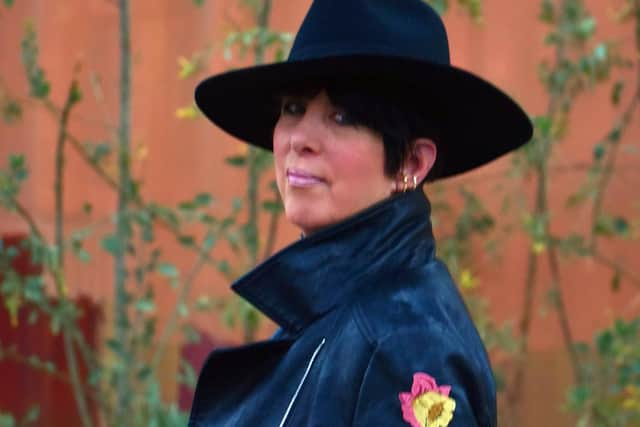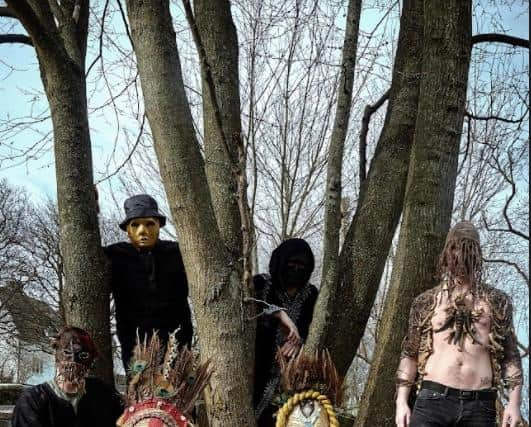Album reviews: Chvrches | The Killers | Diane Warren | Goat


Chvrches: Screen Violence (EMI) ***
The Killers: Pressure Machine (EMI) ****
Diane Warren: The Cave Sessions Vol. 1(Di-Namic/BMG) **
Goat: Headsoup (Rocket Recordings) ****
Horror film convention often dictates that a young woman should be the last character standing – but only after fighting off a catalogue of grisly, sometimes humiliating challenges. To a suitably gothic synth pop backing, Chvrches frontwoman Lauren Mayberry puts herself in those shoes – “I need to get out now while most of me is intact” – on the band’s new album, Screen Violence.
Video nasty associations aside, the title also denotes the aggression that pours from our smaller screens. Mayberry herself is no stranger to toxic threats via social media for speaking out against misogynist attitudes. She has words on controlling sexist behaviour on He Said She Said, lamenting “I tried but it’s hard to know what’s right.”
Advertisement
Hide AdAdvertisement
Hide AdMayberry balances emotional intelligence with intellectual eloquence throughout this fourth album, while the music continues to expand to fill the arenas which are now the trio’s touring environment. Asking for a Friend pairs iridescent synthesizers with stadium-sized beats before hitting maximum bleepage in the space of a couple of choruses.


Screen Violence comfortably straddles the commercial and alternative spheres. Album guest Robert Smith has dominated that territory for decades, and his unmistakeable quavery voice gets a window to breathe on How Not to Drown before it is swamped in swirling synths, sonorous gothic guitar and Mayberry’s more strident delivery of the “watch as they pull me down” hookline.
There is light among the shade. The Go-Gos-style pop hook of California is swathed in swelling synths and brass. But the album’s poppiest moment, Lullabies, is duly followed by Nightmares, an epic industrial power ballad with a Vangelis middle eight, built for big screen action, violent or otherwise.
The Killers’ latest, Pressure Machine, is an example of what a band can do when they are unexpectedly liberated from the need to tour their latest album into the ground. Brandon Flowers draws on his upbringing in Nephi, Utah to produce snapshots rather than trenchant portraits of drug addicts and desperados, interspersed with samples of the regular townsfolk.
This is a well-worn musical highway, from the acoustic folk rock of Runaway Horses to the reedy 80s indie of In The Car Outside. West Hills begins as intimate Springsteenesque storytelling and ends as huge as the desert sky. Terrible Thing is a touching portrait of a homosexual teen in a conservative small town, while the richest and finest vignette is Desperate Things, a downbeat indie film in song form.


Songwriting supremo Diane Warren first came to prominence in the Nineties, scoring big, bombastic hits with Cher’s If I Could Turn Back Time, Aerosmith’s I Don’t Want to Miss a Thing and LeAnn Rimes’ How Do I Live. Now she mines her enviable contacts book for star singers to front her debut album.
Warren doesn’t write by committee, favouring streamlined pop songs and practised patterns using whatever is the surefire sound of the day. The Cave Sessions Vol.1 features multiple ways to convey summery escapism and heartbreak, doused in lashings of Latino and reggaeton flavour.
Advertisement
Hide AdAdvertisement
Hide AdElsewhere, Maren Morris helms the commercial country of I Save Me, former Fifth Harmony member Lauren Jauregui relishes the retro girl group sway of Not Prepared For You and Warren re-partners with Celine Dion and Paloma Faith who chew the scenery on their respective variations on the time-honoured survivor theme.
Swedish psych collective Goat make like a rural hippy cult but have masterminded their whole Slits-meets-Fela Kuti concept from urbane Gothenburg. The Rolling Stones-referencing Headsoup is a compilation of non-album tracks from the past decade, blending Krautrock grooves, restless Afrobeat rhythms, mesmeric desert rock reveries and strident vocal incantations from their voodoo priestess frontwomen, plus two new tracks, the psych funk Fill My Mouth and epic wah-wah wigout Queen of the Underground.
CLASSICAL
Calum Huggan: American Marimba Music (Delphian) ****
This is Scots percussionist Calum Huggan’s debut album with Delphian, but he’s already known to Scotsman readers having contributed last year to the award-winning Scotsman Sessions, playing one of the tracks – Nancy, by Emmanuel Séjourné – that feature on this tribute to American marimba music. It’s partly the nature of the instrument that defines the haunting character of Huggan’s performances, together with the pulsating rhythmic life and innate sensitivity he derives from a cool collection of works by Michael Burritt, Ivan Trevino, Séjourné and Eric Ewazen. The distinctiveness of this repertoire stems from its multiple influences, an interconnected group of composers whose interests lie beyond the classical field in such popular idioms as indie-rock, pop and jazz. Huggan captures the essence of each. The mood is inherently subdued and hypnotic, but with plenty of sunburst moments allowing him to demonstrate the brighter side of an instrument he has full command of. Ken Walton
FOLK
Sean Gibbs: When Can I See You Again (Ubuntu Music) ****
This second quintet recording from Edinburgh-raised, London-based Sean Gibbs, known for his work with the Scottish National Jazz Orchestra and much else, finds him in robust fettle. This time it’s a twin-horn ensemble, with tenor saxophonist Riley Stone-Lonergan, pianist Rob Brockway, drummer Jay Davis and fellow SNJO stalwart Calum Gourlay on bass. All compositions are by Gibbs and the opener, Internal Conflict, cleaves a single-minded, straight-ahead path with trumpet and sax sounding in sharp unison before Gibbs takes an unhurried break and the sax also flexes its muscles. Mary is a good old-fashioned ballad featuring clear-toned trumpet, there’s a good-humoured swagger to Camperdown, a sustained note from Gibbs introducing limber solos from himself and Stone-Lonergan, and a joyful township bustle to Happy Hour, the groove established by Rob Brockway’s piano. The title track maintains the spirited melodic vibe that pervades the album. Jim Gilchrist
A message from the Editor
Thank you for reading this article. We're more reliant on your support than ever as the shift in consumer habits brought about by coronavirus impacts our advertisers.
If you haven't already, please consider supporting our trusted, fact-checked journalism by taking out a digital subscription at https://www.scotsman.com/subscriptions